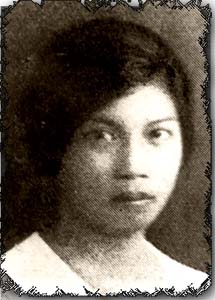Tweet
(spoiler alert)
The title of this blog post is not the title of the short story I am going to share in a moment, but it is among the first few thoughts born after reading “Sunset” by Filipino writer, Paz Latorena, the latest writer whose works Mel U of The Reading Life and I are exploring for our Readings in Philippine Literature: Short Stories project (which, by the way, you are very much invited to join in).
Of course, a man wants to live with a woman he likes or loves. I’m sure he would even say he will marry the same woman in a heartbeat. There’s a “but” coming, though… But marriage… Well, as they say, it’s an expensive business—licenses, church fees, food, dresses, transportation, and all other hoopla to make it one memorable celebration. Oh, you could see a growing number of young couples in the Philippines today doing this—living together but not marrying because of lack of money—causing elders who strongly believe in Church vows before God as the ideal way to start a happy marriage to raise their eyebrows in question and speculation.
In Latorena’s “Sunset”, the eyebrows were raised even higher. The year (it was written), after all, is 1929, a time when respectability and social mores still strongly prevail, such that “even the slums had a code of morals, however loose”. It tells the story of a maid and a cobbler who meets when the former stumbles upon the latter’s house after she ran away from her employer’s house where she was harassed by a certain man named Pepe (who later turns out to be her employer’s brother). Like a fairytale story, it is love at first sight for the two of them (and I think this is the scene I could call “psychologically forced”). The cobbler asks the maid to live with him with the promise that they will get married as soon as he has money.
However, a cobbler’s life is hard. The man is barely earning enough to keep them both alive. When the maid’s good señorita tracks her down to take her back, the maid declines because she loves her cobbler and she has high hopes they will get married soon. The last pay the señorita offers her provides her the idea of giving it to the cobbler with her employer’s help, with the anticipation that now the cobbler has money, he will marry her. The ending, well, let’s just say it turned out differently than what she expected it to be.
 |
| Paz Latorena (Image Source) |
The writer was born in Boac, Marinduque. She studies in Manila and graduate from the University of the Philippines with a B.S.E. degree. She then took graduate courses at the University of Sto. Tomas where she later taught literature and creative writing.
I could not find a copy of Sunset online, except this (incomplete) one: Sunset by Paz Latorena.
You should head over to Mel’s post about Latorena’s other beautiful short story, “The Small Key”.
Now, I pose to you the complete question taken from this blog post’s title: When a man loves a woman but would not—could not—marry her, what do you think will happen to the two of them?
- Nancy -